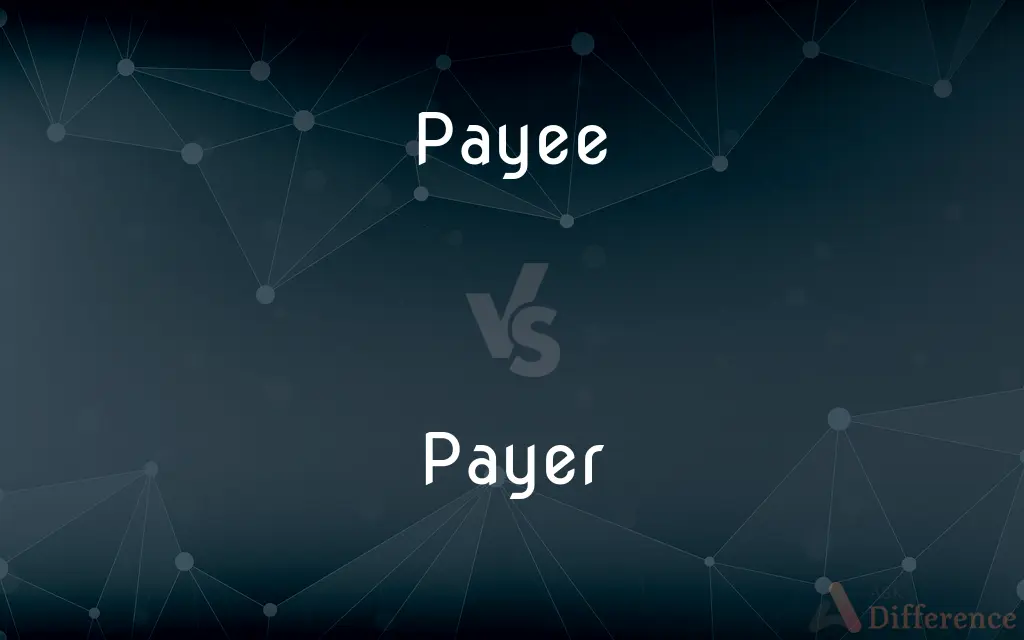Payee vs. Payer — What's the Difference?
By Tayyaba Rehman — Updated on August 22, 2023
The payee is the recipient of funds, while the payer is the one who dispenses or sends the funds.

Difference Between Payee and Payer
Table of Contents
ADVERTISEMENT
Key Differences
The term payee refers to the individual or entity that is set to receive funds or a payment. On the other hand, the term payer refers to the individual or entity that is providing or sending the funds. Both these terms are commonly used in financial transactions to clarify roles and responsibilities.
A payee, being the recipient, is usually the one who provides a service or product. Once the service or product has been delivered, the payee expects payment in return. The payer, meanwhile, is the one who owes or needs to give out this payment as a result of availing of the service or product.
In banking and finance, a payee might be a person's name written on a check, implying that the check can be cashed or deposited by that individual or entity. The payer, in contrast, is the individual or entity whose account will be debited or charged for that check.
Every transaction, whether it's online or offline, involves at least a payee and a payer. For instance, in online shopping, the shopper is the payer and the online store is the payee.
Contracts, bills, invoices, and receipts all utilize the terms payee and payer. The payee's name is crucial as it ensures the funds go to the right recipient, while the payer's details are essential for accountability and tracking purposes.
ADVERTISEMENT
Comparison Chart
Definition
The recipient of funds.
The individual or entity dispensing the funds.
Role in Transaction
Expects to receive payment.
Needs to provide or send out payment.
Banking
Name written on a check to cash or deposit.
Account debited or charged for the check.
Responsibility
Delivering service or product.
Ensuring payment for availed service or product.
Documentation
Appears on receipts and invoices as the one getting paid.
Appears as the one providing or sending the payment.
Compare with Definitions
Payee
The party in a financial transaction who receives funds.
The check was made out to Anna, the payee.
Payer
The party in a financial transaction who gives or sends money.
John, the payer, transferred the funds through online banking.
Payee
An individual or entity that is owed money for goods or services provided.
The invoice listed the company's name as the payee.
Payer
An individual or entity that owes money for availing services or products.
The payer's details were required to complete the transaction.
Payee
The named beneficiary on financial documents.
Ensure the payee's name is written correctly on the bank transfer.
Payer
The originator of a financial payment.
As the payer, he had to ensure the right amount was sent.
Payee
A person or organization that receives payment.
The payee details were mentioned at the bottom of the bill.
Payer
A person or organization that gives someone money that is due for work done, goods received, or a debt incurred
The industry is one of the biggest payers of corporation tax
Licence payers
Payee
A person to whom money is paid
Payer
The one responsible for making a payment in any form of transaction.
The online system showed the payer's name and transaction details.
Payee
The one to whom money is to be paid in any form of transaction.
The online platform sent the money directly to the payee's bank account.
Payer
A person or organization that disburses payment for an obligation.
The payer settled the invoice within the stipulated time.
Payee
One to whom money is paid.
Payer
One named responsible for paying a bill or note.
Payee
The person to whom money is to be, or has been, paid; the person named in a bill or note, to whom, or to whose order, the amount is promised or directed to be paid. See Bill of exchange, under Bill.
Payer
One who pays; specifically, the person by whom a bill or note has been, or should be, paid.
Payer
One who pays; specifically, the person by whom a bill or note has been, or should be, paid.
Payer
One that pays
A prompt payer of bills.
Payer
(finance) A swaption which gives its holder the option to enter into a swap in which they pay the fixed leg and receive the floating leg.
Payer
A person who pays money for something
Common Curiosities
What is a payee in a transaction?
The payee in a transaction is the individual or entity set to receive funds or payment.
Can the payee and payer be the same in a transaction?
Yes, in certain scenarios like self-checks or account transfers, the payee and payer can be the same individual or entity.
How does the role of the payee differ from that of the payer in an invoice?
The payee is the one receiving payment as listed on the invoice, while the payer is the one who owes or provides the payment.
Who is considered the payer?
The payer is the individual or entity responsible for sending or providing funds in a transaction.
How can a payer ensure they are paying the correct payee?
A payer can ensure this by double-checking payee details like name, account number, and other relevant information before initiating payment.
Why is it crucial to accurately name the payee in financial documents?
Correctly naming the payee ensures that funds are received by the intended recipient, avoiding potential financial discrepancies or fraud.
What happens if the payer doesn’t fulfill their obligation?
If the payer doesn't fulfill their obligation, the payee might not deliver the service or product, or may take legal action to recover the owed amount.
Is the payer always an individual?
No, a payer can be an individual, company, organization, or any entity that owes money.
In online transactions, who is the payee?
In online transactions, the payee is usually the online merchant or service provider set to receive payment from the shopper or client.
Can both terms, payee and payer, be used in non-financial contexts?
While primarily financial, the terms can be used metaphorically in non-financial contexts to represent a giver and a receiver.
Share Your Discovery

Previous Comparison
Prolific vs. Productive
Next Comparison
Artificial vs. SyntheticAuthor Spotlight
Written by
Tayyaba RehmanTayyaba Rehman is a distinguished writer, currently serving as a primary contributor to askdifference.com. As a researcher in semantics and etymology, Tayyaba's passion for the complexity of languages and their distinctions has found a perfect home on the platform. Tayyaba delves into the intricacies of language, distinguishing between commonly confused words and phrases, thereby providing clarity for readers worldwide.













































